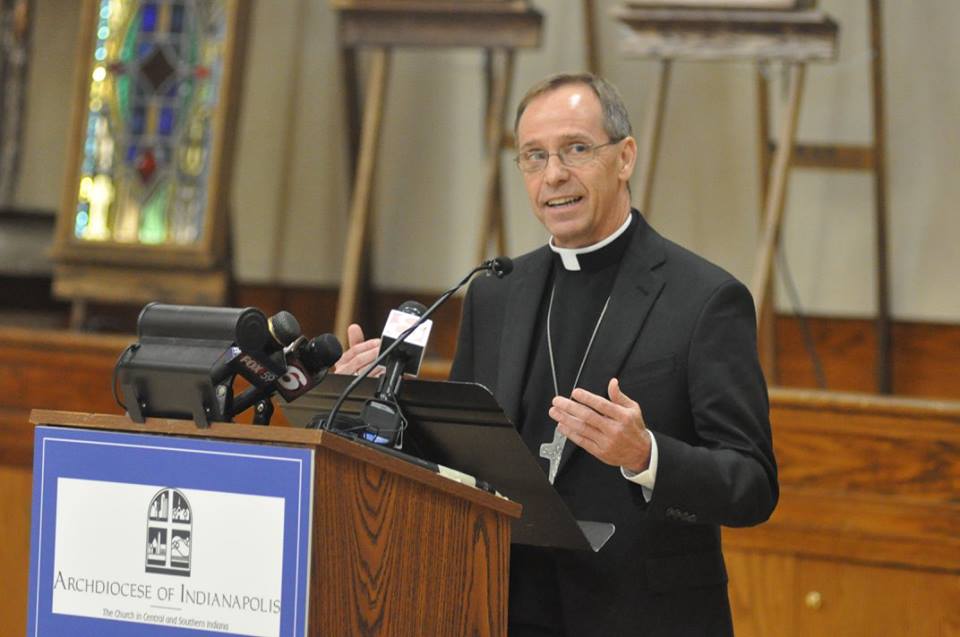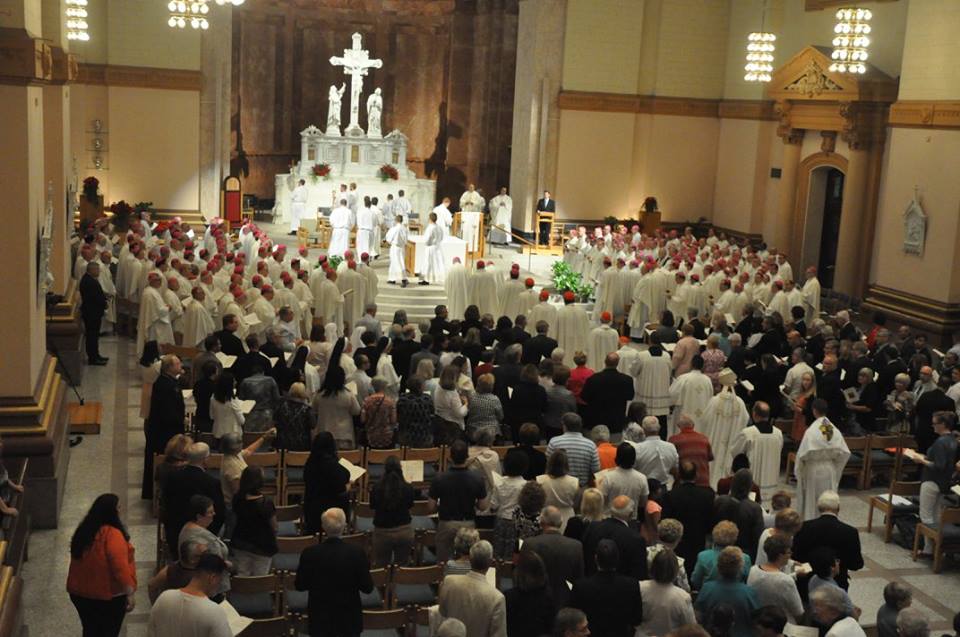
US Bishops kneel in prayer for healing of survivors of clergy sex abuse during special Mass at Sts. Peter & Paul Cathedral, Indianapolis. (Photo Credit, Criterion, Indianapolis)
Monday of this Week, I arrived in Indianapolis for the June 2017 Meeting of the United States Conference of Catholic Bishops. I was pleased that a good percentage of our time together was spent discussing pastoral issues of concern to many of our people across the United States.
Another highlight was our Mass together on Wednesday evening, June 14 at the Indianapolis Cathedral of Saints Peter and Paul. This past year, Pope Francis asked that every Episcopal Conference offer a Mass of Prayer & Penance for Healing of Survivors of Clergy Sex Abuse – and this was our opportunity as a Conference to offer this important moment of prayer.
Archbishop Wilton Gregory of Atlanta gave a powerful homily for the occasion. During the homily, Archbishop Gregory stated: “We can never say we are sorry enough for tragedy of abuse.”
Here is the prayer we offered:
Almighty and Most Loving God, through your Son your compassion brought healing to many.
We ask for your healing once more for all who have been profoundly wounded by abuse, especially those who have been hurt by your ministers. In your mercy, we also ask for forgiveness. Words cannot express fully the sorrow we have for the great harm done by those who were called to be trusted.
In your goodness, we ask for the grace to be a source of healing to all who have been abused and to be ever vigilant in protecting all your people. Grant, we pray, our prayers for healing and forgiveness, for we ask them through your Son, Christ our Lord. Amen.
During our meeting, the bishops had a great exchange of information on two very important topics of our time, youth and young adults and immigration. Mindful that the next XV Ordinary General Assembly of the Synod of Bishops in Rome (2018) is directed to better understanding youth and young people in the Church, we heard a powerful presentation from Dr. John Cavadini, a professor at the University of Notre Dame on the Baptismal Vocation; In Light of Discernment of Young People.
We were reminded that the love of Christ claims and calls all of us, especially through Baptism. It is the goal of every Christian to respond first and always to this Love of Christ, and that this love is the sole response and remedy to the world’s addiction to power.
The primary vocation of baptism is to the Eucharist, and especially to the Eucharistic life of the Church. Dr. Cavadini cautioned that the use of the word or concept of vocation is often too one-dimensional in that it is reduced to a vocation ‘of the world’ rather than a vocation ‘to the world.’ The Christian vocation is a call towards the Mystery of the Church. And this is a big challenge, because our young people do not understand the Church – they are content to ‘be a good person.’ Baptism unites us to Christ, in all of his fullness. The Church is the Sacrament of the Solidarity of Christ’s love for the world. One of Dr. Cavadini’s closing remarks was: “If we do not love the Church, we do not love Christ fully, for to see the Bridegroom is to see the bride (the Church.)
The Sacrament of Confirmation identifies us with our Baptismal Grace and our mission as disciples of Jesus Christ. The more our life is ordered to the Eucharist, the more we become Bread for the world. The more we identify our life with Christ’s Love, poured out for the world, the more we are called to be missionary disciples.
After this, we heard from another speaker, Fr. Daniel G. Groody, CSC, a Holy Cross priest about his work with and on behalf of the millions of world-wide migrants. Internationally, there are over 244,000,000 people who have left their homelands, in search of safety or a better life. That is the equivalent of 1 in 35 of the worlds inhabitants! 65,000,000 of those are refugees, and this number is growing by 24,000 daily. In short, we live in an age of migration.
This is a human and spiritual reality, and our task as bishops is to help put a human face on this challenge, so it is not just seen in terms of legal and illegal immigrants, or citizens versus aliens. We were also reminded that there are many different laws that govern us, and it is important to expand people’s understanding of the immigration challenge to broader levels of reality. For instance, there are natural, civil, divine and eternal laws.
We heard a lot in the discussions around immigration this week of the genuine fear that many people live with today. Pope Francis is regularly challenging us to move beyond our fear of others to see them in their humanity. Likewise we are invited to look beyond the ‘usefulness’ of others (based on economic realities) to a ‘connection with’ individuals as brothers and sisters.
When we think of the immigration debate in this country, we are challenged to a higher level of discourse from simple citizenship towards discipleship, which sees the human person through the lens of the Gospel, through the eyes of Jesus Christ. When we think of immigration, these people are often invisible ‘no-bodies’ – and our task is to see them. These are our people struggling to become some-body. They have a connection to us – and to every-body because they too are a part of the Body of Christ.
In 2003, the US Conference of Catholic Bishops published a document entitled Strangers No Longer; Together on the Journey to Hope. The broader principles of migration are outlined here:
- Persons have the right to find opportunities in their own homeland
- Persons have the right to migrate to support themselves and their families
- Sovereign nations have the right to control their borders
- Refugees and asylum seekers should be afforded protection
- The human dignity and human rights of undocumented migrants should be respected
As you can see, our nation and our world have some work to do in order to balance these basic principles. Please join the bishops in prayer that we may advance in that worthy goal.
 Finally, this a good week for the local Church of Indianapolis, the People of God who gave me my faith and called me to my own vocation of the priesthood.
Finally, this a good week for the local Church of Indianapolis, the People of God who gave me my faith and called me to my own vocation of the priesthood.
After a five month vacancy, our Holy Father announced on Tuesday a new Archbishop for Indianapolis, the present Bishop of Evansville, Indiana, Archbishop-Elect Charles Thompson. Archbishop Thompson was ordained a bishop in June, 2011. He is also one of the bishops in my bishops’ support group.
As a young priest, he gained a good reputation as an astute canon lawyer. He has a strong work ethic and a good sense of humor. With this appointment, Archbishop Thompson becomes the youngest Metropolitan Archbishop in the United States. I’m happy for him and for the people of the Archdiocese of Indianapolis.
Congratulations, Archbishop Thompson!
(A special note of thanks to the Catholic Newspaper of Indianapolis, the Criterion for the pictures.)
+pde
2
